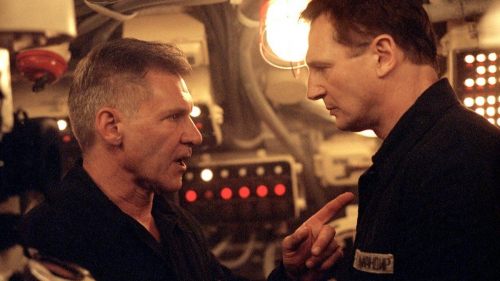FNC2017 Review: SALYUT-7 Salutes Cosmonauts And Thrills Audiences
Space movies are pretty reliable. From The Right Stuff and Apollo 13 to Gravity, Hidden Figures, and some might even add The Martian, most fact-based films about space travel have been pretty good, if not outright great. They can't help but be that way: the subject matter is just too damn inspiring, too high-stakes not to generate some measure of thrills. But most space movies deal near exclusively with the American space programme - probably because they're made in the United States. Enter Salyut-7.
Salyut-7 dramatises the breakdown and subsequent repair of the Soviet space station Salyut-7 in 1985. Regarded as one of the greatest feats of engineering in space-exploration history, the story starts out pretty banal, with the station losing power and communications, and develops into a riveting space thriller. An emergency manned Soyuz mission is dispatched to diagnose and repair the fault, and due to the difficulty of the mission, the required crew ends up somewhat problematic: station designer Viktor Alyokhin, who's never been to space, and ace pilot Vladimir Fyodorov, previously grounded for psychological reasons. What a setup!
As always happens in these movies, the initial attempt at repair turns the situation from bad to worse. As foreshadowed by a nailbiter of a prologue involving a tiny hole in a spacesuit, almost every one of Salyut-7's episodic problem-solving sequences are grip-your-seat suspenseful. There's a docking procedure involving three-axis rotation that puts Interstellar's to shame; run-ins with space-based freezing cold, illness, fire, and flooding (the latter of which makes for some of the film's most dazzling visuals), and a climax wherein ironically, ingenuity takes a back seat to sheer brute force.
All that makes for intense filmmaking, but this wouldn’t be a space movie if it didn’t have a sizeable dollop of human drama on top of the survival-thriller hijinks. Unfortunately, the human drama is Salyut-7’s weak point. Though the two lead performances (Vladimir Vdovichenkov and Pavel Derevyanko) are fine examples of stoic, slightly space-demented Russian acting, their grounded counterparts are less consistent - especially the women. Hard to blame the actors, though: every female character in the film is written as either a voice calling the cosmonauts back home (one wife even gives birth during the mission), or in the mission doctor’s case, a voice steering the cosmonauts away from their dangerous, heroic task. Historically speaking, that might be accurate, but the film never hesitates to demonstrate why the women are wrong and the brave men are right. It's all a bit much.
Dramatically and historically, Salyut-7 might be aping Apollo 13, but technically, it takes after Gravity just as much. The film’s numerous spacewalk sequences feature first-person shots akin to those seen from Sandra Bullock's helmet; we can probably also thank Alfonso Cuaron for inspiring Salyut-7’s dizzying, vertiginous CGI camerawork. It’s still a superb way of visually communicating zero-g sequences, but the comparison is hard to avoid. Even the soundtrack at times sounds more than faintly like Steven Price’s Oscar-winning score. However, Salyut-7 breaks out of Gravity's grip by using a technique more effective and, incredibly, cheaper than CGI: shooting in actual zero gravity and, according to the film's producers, in actual space. As a result, Salyut-7 looks about ten times as good as its budget would suggest.
The most notable element setting Salyut-7 aside from its American counterparts is its politics. Though the station originally malfunctioned with nobody on board, threatening no lives, it happened to do so at the height of the Cold War. Thus, a great deal of the narrative's tension comes from preventing the Americans from capturing the space station with their newfangled Space Shuttle, whose cargo payload was conveniently precisely the size of Salyut-7 itself. The impending American launch puts an additional ticking clock on the proceedings (beyond that of the cosmonauts’ survival), but also inverts the usual political slant seen in space films. Though distinction is drawn between the Soviet military forces and the scientists simply focused on saving their station and people, the Soviets are the good guys here. It's fascinating to watch.
That political slant, however, means the history - though it certainly took place, more or less - is permeated by the unmistakable scent of propaganda. Much of the exaggeration is likely purely for dramatic purposes - like a hilariously overblown salute of respect from passing American astronauts - but there’s such a strong vein of nationalism in the story that some must be for political ends. Perhaps that just illuminates the propaganda in American movies that we’ve been trained out of seeing. Perhaps Russia has a propaganda problem that persists to this day. Perhaps both. As a result, it's best to approach Salyut-7 with some skepticism - or better yet, as the dramatically intensified thriller that it is.
People could well complain that Salyut-7 is overwrought. They're not wrong, but I would counter that it is impossible to overdo the drama of true space stories. Whatever the political reasons that launched them, space missions have generated some of humanity's bravest and most brilliant achievements. Salyut-7 is the story of one of those achievements, and it does its subject (and country!) proud. The film may suffer when it’s on the ground, but when it’s in space, it soars.



